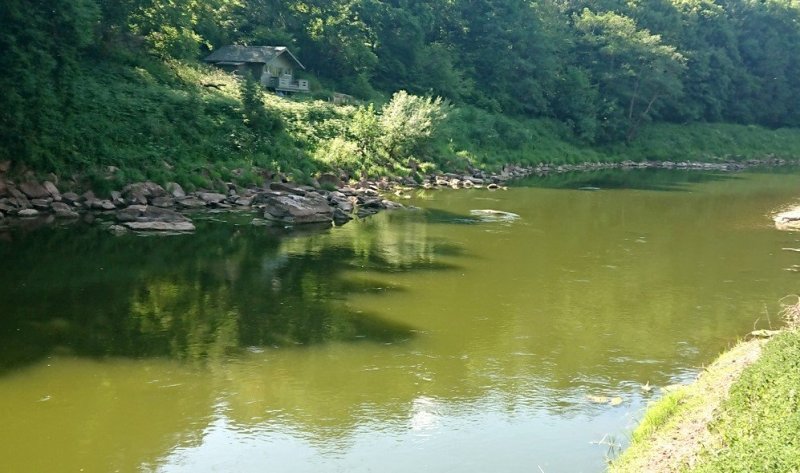Welsh farmers hit back at River Wye algae claims

Welsh farming leaders have criticised claims made by environmentalists that poultry farms have caused the River Wye to turn green with algae.
The Usk and Wye Foundation has suggested that phosphate - coming from poultry farms close to the river's tributaries - had caused a 'severe algal bloom'.
The charity said as a consequence, this had affected the amount of oxygen in the water which could potentially harm wildlife.
"Since 2008 the catchment of one of the river’s tributaries in Powys now hosts an extra ten million chickens.
"This has produced massive amounts of highly reactive phosphates from their manures,” said the report.
Responding to the claims, NFU Cymru said the Foundation's viewpoint amounted to a 'one-dimensional' presentation of the issues.
Geraint Watkins, NFU Cymru Brecon & Radnor county chairman, said the views were 'concerning' and 'distressing' for farmers within the catchment.
"This most recent criticism comes at a time when farmers are working hard in challenging circumstances to keep the nation fed in the midst of the coronavirus.
“The evidence is unequivocal that there are a range of issues and sectors influencing water quality in Wales and within the River Wye."
This included sewage discharges, forestry, acidification, abandoned mines and contaminated land, as well as physical modifications that alter flows and barriers that impede fish migration, Mr Watkins said.
“We are disappointed that, in pursuit of its agenda to pinpoint farming, and in particular poultry farming, as the cause of water quality issues within the Wye, this article fails to acknowledge a broader suite of evidence and facts relating to water quality.
“This includes the fact that comprehensive monitoring data undertaken by the regulator over the short and long term shows an improving picture with respect to water quality in Wales."
Evidence also showed a long-term decline in the overall application rates of nitrogen, phosphates and potash since 1983, Mr Watkins explained.
He added that the article also failed to acknowledge the influence that record low flows as a result of the dry weather, when Wales received just 17% of average rainfall, have had on the river and water quality.
“The failure of the aforementioned organisations to properly present the evidence in relation to water quality in the River Wye, and other water sources in Wales, is damaging and will prove counterproductive," Mr Watkins continued.
"It only serves to undermine the credibility of the organisations concerned within the farming community who they receive funding to work with.
"A focus solely on farming will also fail to deliver water quality improvements in line with water framework directive goals."
Powys County Council has also refuted the claims made by Usk and Wye Foundation. The council has said it was 'fully aware' of its statutory duty to conserve and enhance biodiversity.
“Where planning applications, including those for intensive livestock units, have the potential to impact on the River Wye Special Areas of Conservation, they are assessed, under the habitats regulations, to evaluate their acceptability,” it said.








